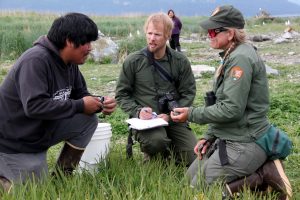Harvesting in the Park

For centuries, Tlingit people of southeast Alaska lived, hunted, fished, and gathered at Bartlett Cove in Glacier Bay, abandoning and rebuilding settlements as glaciers advanced and retreated during and after the Little Ice Age. But a different historic episode froze the tribe out of the area in 1925 when the National Park Service designated Glacier Bay a national monument and banned Tlingits from their ancestral homeland.
Now, the Huna Tlingit and Park Service are ushering in the tribe’s return to Glacier Bay, with the new tribal house and a renewal of traditional harvesting of glaucous-winged gull eggs in the park.
The progress at Glacier Bay is one sign of how the Park Service is rebuilding its relationships with tribes. In its centennial year, the agency clarified a rule to enable native plant gathering in national parks, and has officially recognized the importance of tribal knowledge and practices tied to the natural world—called traditional ecological knowledge (TEK)—in guiding park management.
Hakai Magazine, September 7, 2016

